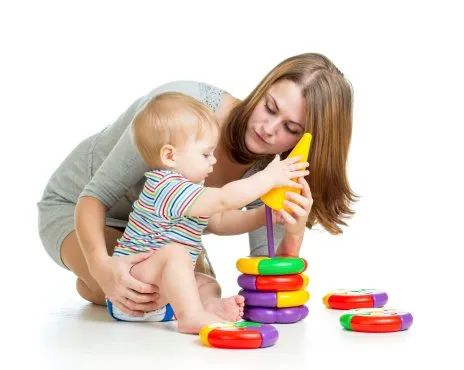Top 3 Tips to Raise an Infant the Montessori Way: Maximizing His Potential
 As I look down into the eyes of my 7 week old, I am captivated by the vast potential that lay behind those grayish-blue eyes gazing back at me. Being educated in the Montessori Way (via the Age of Montessori Informational Course), I realize the first 3 years of life are the most important for the development of trust, self-esteem, intelligence and so much more. It is the period Montessori called “The Absorbent Mind” because the child learns without being taught. He takes in everything in his environment without effort and without discrimination in a process that allows for a great explosion of learning. As Montessori said, “if we compare our ability as adults to that of the child, it would require us 60 years of hard work to achieve what a child has achieved in these first three years” (The Absorbent Mind, p.6).
As I look down into the eyes of my 7 week old, I am captivated by the vast potential that lay behind those grayish-blue eyes gazing back at me. Being educated in the Montessori Way (via the Age of Montessori Informational Course), I realize the first 3 years of life are the most important for the development of trust, self-esteem, intelligence and so much more. It is the period Montessori called “The Absorbent Mind” because the child learns without being taught. He takes in everything in his environment without effort and without discrimination in a process that allows for a great explosion of learning. As Montessori said, “if we compare our ability as adults to that of the child, it would require us 60 years of hard work to achieve what a child has achieved in these first three years” (The Absorbent Mind, p.6).

As I consider how powerless I am to “teach” him, I also simultaneously realize the great responsibility that is in my hands as his caregiver (his mother). Even though I cannot directly teach him different letters, shapes, or concepts, I have the opportunity to greatly impact his learning by the experiences I provide him in touch, sight, sound, smell, and social interaction. So here are some key ideas to impact your infant’s potential.
1. Spend time with him. This is incredibly simple to understand, and has been the hardest thing for me to do.  Why? Because of the pressures in the world that pull caregivers away from just being present with the children in their presence. The visitors coming over in an hour to see my child cause me to feel pressured to clean the house, and take out the trash. My own inner guilt says ,“The least you can do is make dinner for your husband”, and I get swept in books and websites telling me what exercises to focus on to get back to that “pre-baby body”. All these things tempt me away from spending time with this precious being, and yet face-to-face human connection is one of his greatest teachers in this period. He begins to learn about speech by watching me form words and sounds, he learns he is safe and loved in my loving gaze, and he begins to learn rhythm and rhyming as I sing.
Why? Because of the pressures in the world that pull caregivers away from just being present with the children in their presence. The visitors coming over in an hour to see my child cause me to feel pressured to clean the house, and take out the trash. My own inner guilt says ,“The least you can do is make dinner for your husband”, and I get swept in books and websites telling me what exercises to focus on to get back to that “pre-baby body”. All these things tempt me away from spending time with this precious being, and yet face-to-face human connection is one of his greatest teachers in this period. He begins to learn about speech by watching me form words and sounds, he learns he is safe and loved in my loving gaze, and he begins to learn rhythm and rhyming as I sing.

2. Bring the learning to him. He cannot yet crawl to choose a toy in the room, so he depends on you to present learning tools to him. It can mean reading him a story, or  shaking a rattle in front of his face, but look beyond just visual stimulation and think of ways to vary his experience with sound, smell, and touch. It also can be as simple as placing various objects (with different textures) in his hand throughout the day (from bumpy jewelry to a silky scarf), or allow him to smell different foods as you prepare them for yourself.
shaking a rattle in front of his face, but look beyond just visual stimulation and think of ways to vary his experience with sound, smell, and touch. It also can be as simple as placing various objects (with different textures) in his hand throughout the day (from bumpy jewelry to a silky scarf), or allow him to smell different foods as you prepare them for yourself.

3. Make noise. I don’t mean to be loud, but consider ways to engage the neurons that are developing around hearing by playing various types of music. Pop culture has emphasized the value of classical music, but there is also great benefit in exposing his little ears to various styles of music, as each provides his brain with new content to organize. Consider Salsa, African drums, acoustic guitar, etc.
In conclusion, though your child will be absorbing much more than you will ever truly know, the more variation you provide in his environment, the better. Learn more via our free webinar replay of Raising Your Infant or Toddler the Montessori Way!
Consider taking this rich short-course that provides an excellent foundation for Montessori Teachers and Parents!





















